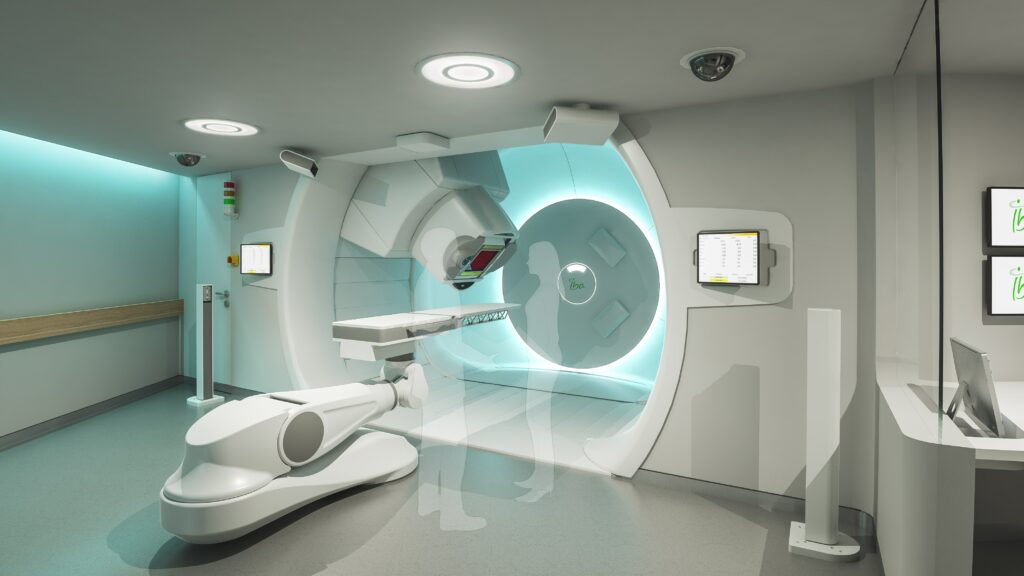
What is proton radiation therapy?
Proton therapy is a form of radiation treatment that destroys cancer cells using protons instead of photons, which are used in standard X-ray radiation. Protons are positively charged particles, while photons are high energy X-rays. Both kill cancer cells or slow their growth by damaging cancer cell DNA.
How many patients need radiation to treat their cancer?
More than 50% of all cancer patients need radiation therapy during the course of their illness. The goal of radiation in cancer treatment is to target a tumor with radiation while sparing surrounding healthy tissue and organs.
Why is proton radiation unique?
Protons can be precisely conformed to release most of their energy directly into a cancerous tumor. This fundamental physics characteristic allows for proton radiation to markedly reduce the amount of healthy tissue that is exposed to radiation and minimize side effects.
Is proton radiation better than standard X-ray radiation for all cancers?
Proton radiation is more effective than standard X-ray radiation in treating certain solid tumors. Compared with photon X-ray radiation, proton therapy is more effective at depositing radiation exactly at the tumor site. Less radiation reaches the healthy tissue surrounding the tumor, resulting in fewer side effects. This includes all tissues between the skin and the tumor deep inside the patient. In addition, metastatic tumors that are close to critical organs can also be treated more effectively with proton therapy due to the ability of the proton beam to target only the tumor and spare critical organs.
What cancers can and cannot be treated with proton radiation?
Proton radiation is an effective treatment for a wide range of solid tumors, particularly those that are hard to treat with traditional radiation therapy. This is an important treatment option especially for children with cancer,
as their long survival time can expose them to the lasting effects of photon radiation toxicity.
Adult Cancers
Proton therapy is a treatment option for adults with localized malignant and benign tumors that have not spread to other parts of the body. Proton therapy is generally used to treat these types of adult cancers: Brain
- Spine
- Breast
- Esophageal
- Head and Neck
- Liver
- Lung
- Lymphomas
- Eye
- Pancreatic
- Sarcomas
- Prostate
- Bone
- Skull
Pediatric Cancers
Radiation therapy is an important component of the treatment of many pediatric tumors, however, it has side effects that are important in children.
Normal cells, tissues and developing organs can also feel the effects of radiation. Children with cancer receive treatment while they are still growing and developing, and their cells are still dividing. Depending on the area treated, radiation can cause cognitive problems, hearing loss, lung scarring, kidney failure, infertility, hormonal problems, short stature, asymmetric bone growth, scoliosis and heart failure. Long-term side effects can happen years after radiation. Therefore, pediatric cancer survivors are more likely to have long-term side effects not only because their tissues may be more sensitive, but because they have the rest of their lives to be affected.
Pediatric cancers that can be treated with proton therapy include:
Brain Tumors
- Medulloblastoma
- Atypcial Teratoid Rhaboid Tumor
- Supratentorial Primitive Neuroectodermal Tumor
- Pineoblastoma
- Ependymoma
- Cranopharyngioma
- Glioma
- Germ Cell Tumor
Head & Neck Cancers
- Parotid Carcinoma
- Nasopharyngeal Carcinoma
- Neuroblastoma
- Retinoblastoma
Sarcomas
- Rhabdomyosarcoma
- Leiomyosarcoma
- Lipsarcoma
- Fibrosarcoma
- Synovial Sarcoma
- Osteosarcoma
- Chondrosarcoma
- Ewing Sarcoma
Can children of any age receive proton radiation?
There is no minimum age to be eligible for proton radiation therapy. This is a clinical decision made by a pediatric radiation oncologist, hematologist/oncologist and/or a pediatric neuro-oncologist and the patient’s family.
How does proton radiation improve cancer outcomes?
This treatment approach drastically reduces the risk and severity of side effects, including the development of secondary cancers. Recovery times are much quicker and the overall quality of life is better.
Why is proton radiation therapy essential for cancer care in Arkansas?
Currently, Arkansas cancer patients who need proton radiation must travel out of state for this treatment to one of only 43 proton centers in the U.S.
Proton therapy significantly reduces injury to normal tissue, which results
in decreased side effects and improved quality of life for the patient. It also improves overall survival for many patients.
